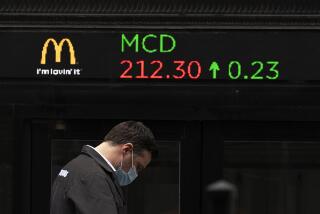New German Tax May Scare Off Investors
- Share via
FRANKFURT, West Germany — West Germany’s financial markets could suffer a massive flight of capital if Bonn goes ahead with a plan to impose a new 10% withholding tax on interest earnings in 1989, analysts said Monday.
“West Germany as a financial center has been dealt a body blow,” said a stock analyst, echoing the gloom in the markets the day after the controversial levy was announced.
The tax, which is designed to raise revenues to finance tax reform, will apply to interest payments on all domestic bonds and Eurobonds of any currency denomination held within West Germany, Finance Minister Gerhard Stoltenberg said at a news conference Sunday.
Foreign investors from countries that have signed accords with Bonn to prevent double taxation would be able to reclaim the tax, he said.
But analysts said they expected investors, especially the foreign ones, to look for ways to shield their funds, benefiting Europe’s rival financial centers.
“The tax is really going to scare foreign investors off,” said Hugh Smith, an economist with the brokerage house Hoare Govett in London.
“The only practical way to escape the new tax is to invest abroad,” said an analyst with a German bank.
“Financial London can celebrate today,” another analyst said.
The only positive factor is that the tax will not be introduced until 1989, he said. “It gives investors more than a year to decide exactly what to do and where to invest funds.”
Investors’ anxieties were aggravated Monday when the finance ministry failed to disclose details of the tax, as promised. This led to another turbulent day in the financial markets. The Commerzbank equity index fell 24.2 points to 1912.4, after a 43-point decline Friday when news of the tax proposal was leaked.
Franz-Josef Trouvain, chief economist at Deutsche Bank, West Germany’s largest bank, said Stoltenberg clearly had not thought through the implications of the tax.
He said the government was not likely to collect the $2.5 billion a year it hoped to raise from the tax, as investors could easily avoid it by moving their funds abroad. Luxembourg, where investment earnings are not taxed, would be an obvious alternative, Trouvain said.
More to Read
Inside the business of entertainment
The Wide Shot brings you news, analysis and insights on everything from streaming wars to production — and what it all means for the future.
You may occasionally receive promotional content from the Los Angeles Times.










